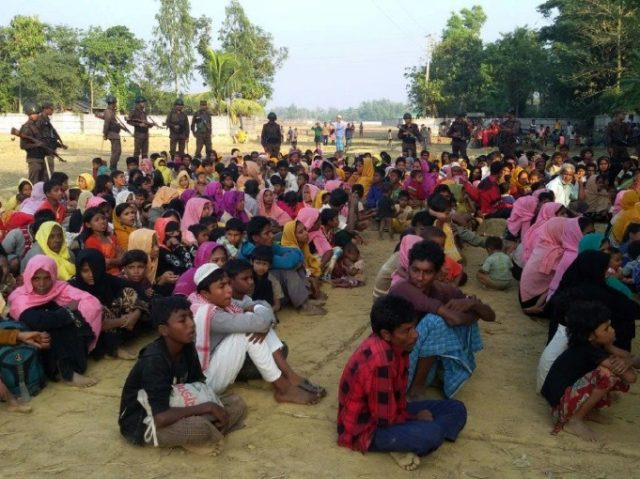U.S. Deputy Assistant Secretary of State Patrick Murphy is on his way to Myanmar, where he will meet with officials to discuss the government’s response to Rohingya insurgents and the resulting mass flight of Rohingya across the border into Bangladesh. He will not, however, be allowed to visit the conflict zone and see for himself how government forces have been treating civilian populations.
There was not a shred of diplomatic finesse about the response from Myanmar. The secretary for Rakhine State, where the Rohingya live, simply said “not allowed” when asked by reporters if Murphy would tour the front lines of the conflict.
Reuters reports that access for humanitarian aid workers has also been restricted. The government of Myanmar says this was done out of concern for their safety.
The Reuters piece quotes a photographer positioned in Bangladesh who said large clouds of smoke could still be seen rising from the Rohingya region. Government forces and/or Buddhist vigilantes have been accused of setting fires to drive the Rohingya Muslims out of their homes and into Bangladesh. The government has accused Rohingya insurgents of setting the fires, an accusation disputed by observers such as Amnesty International.
Before departing for his visit, Murphy summoned Myanmar’s ambassador to the United States to deliver what one senior official described as a “tough” message about the violence in Rakhine State. Murphy demanded public acknowledgment of the Rohingya refugee crisis, a right of return for the refugees, better access for humanitarian aid, and implementation of a U.N. plan of action for resolving the crisis.
State Department officials told CNN the U.S. government is concerned that the military forces of Myanmar are not fully under the control of the civilian government, led informally by Nobel Prize-winning democracy activist Aung San Suu Kyi. There are fears criticizing the government too harshly might cause riots or possibly even set up a military coup – a real possibility for a nation that lived under a junta for decades.
Also weighing on the State Department’s mind is the danger that the Rohingya crisis could destabilize the entire region. Islamist militant groups such as al-Qaeda are using the Rohingya situation to rally Muslim populations across Southeast Asia. Even without the sinister involvement of terrorist organizations, tensions between Muslim and non-Muslim populations are exacerbated as Rohingya refugees arrive in countries like Indonesia and Malaysia.
India may be teetering on the edge of a political crisis because the government wishes to deport about 40,000 Rohingya refugees. Indonesia is also developing a significant refugee problem. In Bangladesh, where the vast majority of fleeing Rohingya have settled, the government has signaled it is not willing to let them stay forever. Unfortunately, many in Myanmar think the Rohingya should stay in Bangladesh forever, as they have historic roots there and are not officially accepted as citizens or even legal residents of Myanmar.
Aung San Suu Kyi is scheduled to address her nation about the Rohingya crisis on Tuesday. Deputy Assistant Secretary of State Murphy is expected to attend the speech.

COMMENTS
Please let us know if you're having issues with commenting.